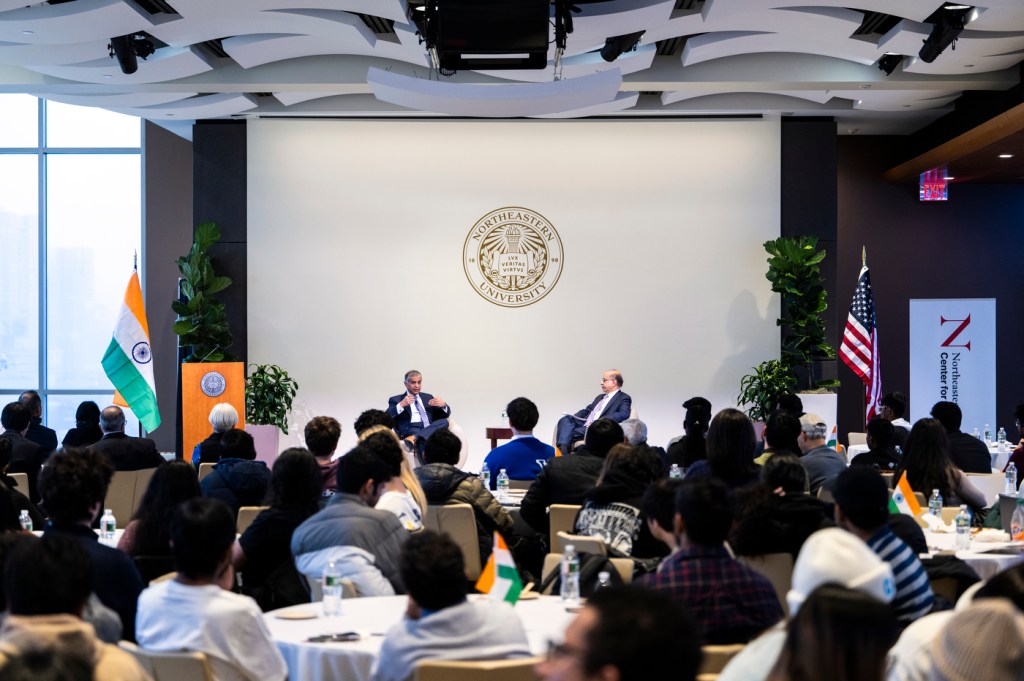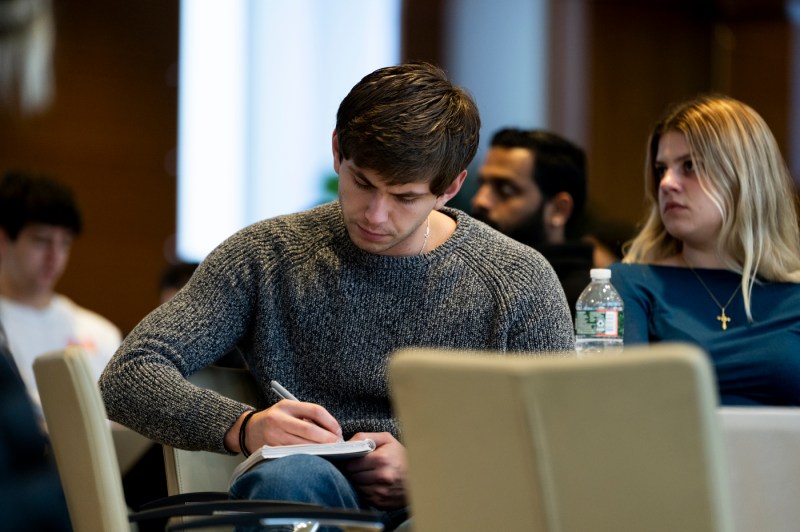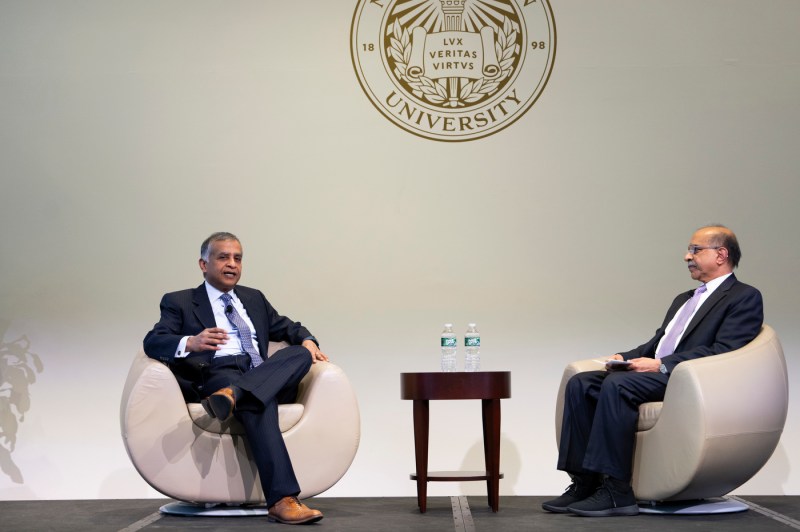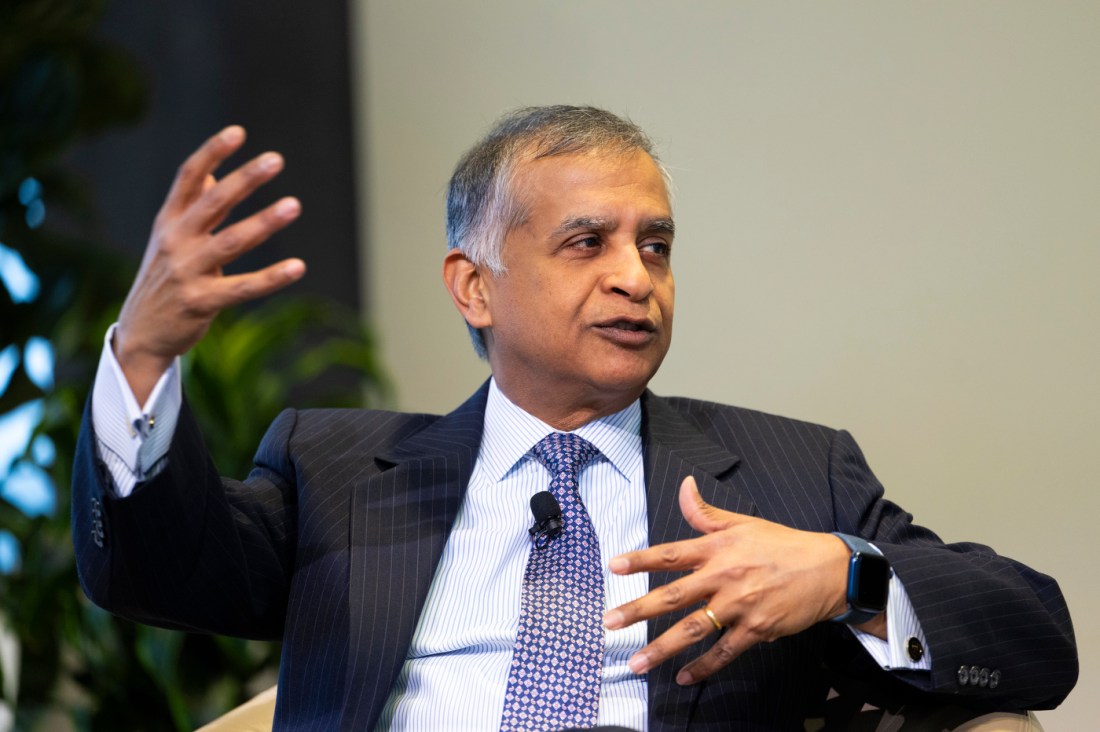How should today’s students prepare to enter a workforce transformed by artificial intelligence?
A Northeastern business professor and a guest speaker addressed that question at the 14th annual Vivek and Vandana Sharma India Lecture put on by the Center for Emerging Markets.

As the world changes, so too does its workforce.
And at the rate that artificial intelligence is innovating everything from business operations and customer service, to workforce education and higher education, the world could (and will) look very different in the coming decades.
That goes for both employers and employees, said Ravi Ramamurti, Northeastern University distinguished professor of international business.
“In the past, technology was managed by one group of people and business by another, except at the highest levels of companies,” he said.
Suresh Muthuswami, chairman of North America for Tata Consultancy Services (TCS), made the case that in the future these roles will merge; the most successful companies will employ workers versed both in the technology and its business applications.
“To get there, companies will have to invest heavily on training employees, and employees will have to embrace lifelong learning,” Ramamurti said. “This is a valuable takeaway for our students as they embark on their careers.”



A multinational information technology company, TCS operates at 150 locations across 46 countries. Ramamurti described the company as one of India’s most successful multinational corporations.
Ramamurti was in conversation with Muthuswami on Tuesday on Northeastern’s Boston campus. It was a wide-ranging discussion that spoke to the rise of artificial intelligence in the private sector, but also how companies can harness technology to support business operations across continents.
The fireside chat was part of the Vivek and Vandana Sharma India Lecture — this year titled “The Promise of AI and Other Enterprise Technologies with Suresh Muthuswami.” It was the 14th annual Vivek and Vandana Sharma India Lecture, hosted by Northeastern’s Center for Emerging Markets.
The two spoke about how employers should anticipate workplace transformations ushered in by AI — and consequently, how employees should prepare to be adequately equipped for those changes.
Featured Posts
In addition to the imperative of lifelong learning, Muthuswami spoke about how the employee toolkit is rapidly changing. Employers are looking for talent versed in “soft skills” as opposed to more specialized skills, with a growing premium placed on problem-solving skills, communication skills and computational thinking. Those tools are going to be more important, he contends, than, say, learning a specific programming language.
“Understanding functional skills — human resources, finance, etc. — those skills are important,” he said.
That’s already happening at TCS, he said.
“We call that contextual knowledge,” Muthuswami said. “So not only do our employees understand the technology, but they understand the business domain, and how to apply that technology to the business domain.”
Of course, significant technological overhaul always creates anxiety about job losses. Muthuswami made the point that many technology leaders are overestimating the speed with which AI will be adopted by companies.
But at a time of historically high inequality, Ramamurti notes that AI’s quantum leap forward may come at further cost to rectifying society’s imbalances. The International Monetary Fund issued a similar warning, noting in a recent report that “the net effect is difficult to foresee, as AI will ripple through economies in complex ways.”
“AI will create many new jobs that don’t exist today,” Ramamurti said. “But I am less sanguine. I worry that there will be a lot of social dislocation, and that income inequality will get further accentuated.”
“Once again, the message for our students is that they must constantly upgrade their skills and stay ahead of the technology curve — whether they are technologists or not,” Ramamurti said.
Asked about how today’s students should be preparing to enter the workforce, Muthuswami said the imperative is clear: Learn AI.
“If you don’t learn AI, that’s going to be a problem,” Muthuswami said. “If you’re going to enter the workforce, your first training program might be through an AI system.”
Ramamurti said he is “delighted that the Center for Emerging Markets was able to host on campus the North American head of an iconic Indian multinational.”
“We explored an important new technology, in a global context, with the leader of a company that is famous for its social responsibility and long-term orientation,” he said.











